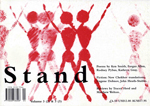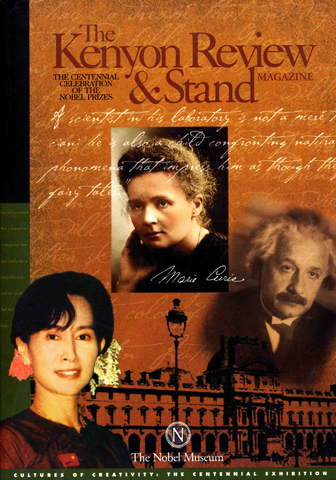Selected Contributors:
Rabindranath Tagore (1861-1941) is acclaimed as the greatest writers in the Bengali language. He wrote brilliantly in every conceivable literary genre, and was also a composer and painter. His songs are the national anthems of two countries: India and Bangladesh. He became the first Asian to win the Nobel Prize when his book, Gitanjali, was honored by the Swedish Academy in 1913. Tagore was a multifaceted genius, and he is recognized as the greatest cultural figure of modern India.
Seamus Heaney’s most recent publications are Opened Ground: Poems 1966-1996 (Farrar, Straus & Giroux, 1998) and Beowulf, A New Verse Translation (W.W. Norton & Company, 2000). A book of poems, Electric Light, will be published in 2001 by Farrar, Straus & Giroux.
Naguib Mahfouz in 1988 became the first Arab Nobel Laureate in Literature. His roughly sixty books cover virtually every style and genre of fiction. He lives in the Cairo suburb of Agouza.
Pablo Neruda’s early books made him famous enough in his native Chile that the government awarded him a series of diplomatic posts in Ceylon, Burma, Singapore, and Spain (just before the Spanish Civil War). Neruda wrote three books during this period under the collective title Residencia en la Tierra (A Stay on Earth). The selections presented here are taken from the first of these. Born in 1904, Neruda was awarded the Nobel Prize in 1971. He died in 1973.
William Butler Yeats (1865-1939) was born in Dublin and educated largely in London. He was part of the fin de siècle literary movement in that city, and returned to Ireland to help advance the Irish literary revival. Although a convinced patriot, Yeats deplored the hatred and the bigotry of the Nationalist movement, and his poetry is full of moving protests against it. Initially better known for his drama, Yeats increasingly turned to lyric poetry and, unusually, wrote much of his greatest and lasting work after receiving the Nobel Prize in 1923.
Wislawa Szymborska was born in 1923. She has published poetry collections sparingly—every seven to ten years. Her first collection was That’s What We Live For (1952), and her most recent is The End and the Beginning (1993). Her poetry is full of wisdom, wit, and a haunting, surreal quality. One of her major themes is differentness, or otherness: the lack of mutual comprehension between different conditions, species, kinds of matter. She asks profound questions about the meaning—or non-meaning—of life—of non-life, often in a deceptively simple, even naïve-sounding, way. She was awarded the Nobel Prize for Literature in 1996. She lives in Kraków.
order back issue
|


